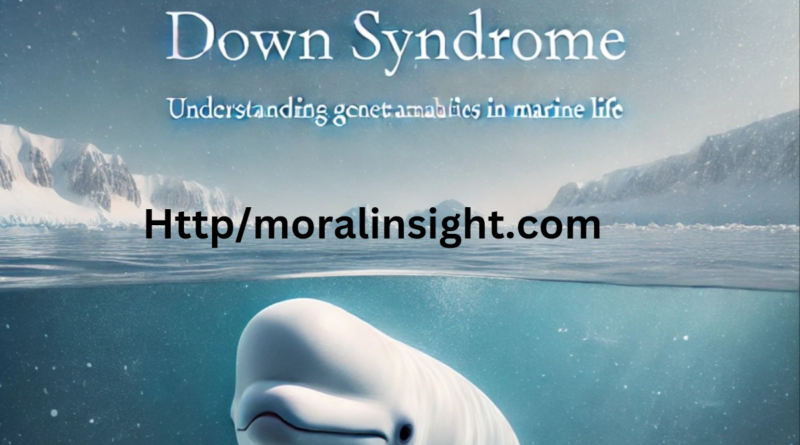Down Syndrome in Beluga Whales: Understanding Genetic Anomalies in Marine Life
Understanding Down Syndrome in Beluga Whales
What is Down Syndrome?
Down Syndrome in Beluga Whales, Down Syndrome is a genetic disease caused by the presence of an extra chromosome 21. In humans, this produces in physical and cognitive disparities. While mostly investigated in humans, comparable chromosomal diseases have been discovered in various species.
Human vs. Animal Chromosomal Disorders
In people, the syndrome leads to distinguishing traits and health difficulties. However, in animals, the manifestation relies on their genetic structure, making it a hard to diagnose such disorders without comprehensive genetic testing.
How Down Syndrome Manifests
In humans, frequent indicators include unusual facial traits, developmental delays and varied degrees of intellectual incapacity. Animals with comparable situations may have morphological or behavioral features that vary from the norm.
Beluga Whales: An Overview
Beluga whales are intriguing marine creatures noted for their social habits and tolerance to Arctic settings.
Habitat and Lifestyle
Belugas inhabit frigid waters, particularly in the Arctic and sub-Arctic areas. Their ability to cross chilly waters and communicate via a diverse variety of sounds makes them special.
Social Behaviors
Belugas are very gregarious, living in pods that act as close-knit communities. This social system plays a crucial role in their survival and communication.
Down Syndrome in Animals
Evidence in Various Species
Instances of chromosomal anomalies have been observed in animals, including chimpanzees and other mammals. These situations typically give insights into the evolutionary features of genetic disorders.
Challenges of Identifying Genetic Conditions in Wildlife
Studying such situations in wild animals is complicated owing to the difficulties in gathering and interpreting genetic data.
The Case of Down Syndrome in Beluga Whales
Can Beluga Whales Have Down Syndrome?
Genetic Similarities with Humans
While beluga whales have a diverse chromosomal composition, genetic similarities with humans give a foundation for examining possible chromosomal diseases in these marine species.
Documented Cases in Marine Biology
There are no completely verified occurrences of Down Syndrome in beluga whales, although anecdotal evidence and continuing study imply the potential.
Identifying Symptoms
Behavioral Indicators
Beluga whales with probable genetic defects may demonstrate odd social behaviors or lower activity levels, making them stand out among their pods.
Physical Characteristics
Physical abnormalities including asymmetry in bodily features or changed skin texture may also serve as markers of hereditary disorders.
How Scientists Study Beluga Genetics Collecting Samples
Researchers gather DNA samples using non-invasive procedures like skin or blubber sampling, frequently needing novel equipment.
Challenges of Underwater Research
Studying belugas in their native habitat is hindered by environmental conditions, such as frigid waters and their migratory habits.
Implications of Down Syndrome in Beluga Whales
Effects on Their Social Structure
How Pod Dynamics May Shift
A beluga with genetic defects could encounter difficulty integrating within its pod, perhaps resulting to isolation.
Potential for Isolation
Behavioral differences might result in isolation, impacting their survival and mental well-being.
Impacts on Survival and Reproduction Challenges in Hunting
Belugas with cognitive or physical disabilities may struggle with hunting, limiting their capacity to flourish in the wild.
Genetic Implications for Future Generations
Genetic diseases may have long-term repercussions for the population’s health and genetic diversity.
Conservation Efforts Supporting Marine Life with Disabilities
Rehabilitation Techniques
Specialized care, including rehabilitation and monitoring, may enhance the quality of life for belugas with impairments.
Importance of Protected Habitats
Creating secure settings guarantees that fragile belugas may thrive without severe dangers from predators or human activities.
Raising Awareness
Role of Education
Educational efforts regarding marine life conservation may generate more public interest in protecting these organisms.
Advocacy Through Research
Continued study is crucial for understanding and safeguarding belugas and other marine creatures with potential impairments.
Conclusion
Beluga whales are fascinating animals and researching genetic abnormalities like Down Syndrome in these species gives vital insights into their biology and difficulties. By recognizing their requirements and promoting conservation efforts, we can assure their survival in the face of hardship.
FAQs
1.What is Down Syndrome and can animals have it?
Down Syndrome is a hereditary disease caused by an extra chromosome 21 in humans. Animals may have comparable chromosomal problems, but they present differently.
2.How do scientists identify genetic abnormalities in marine animals?
Scientists take DNA samples using non-invasive ways and analyze them to find genetic aberrations.
3.Have there been any proven instances of Down Syndrome in beluga whales?
While no documented examples exist, continuing study studies the potential of similar illnesses in belugas.
4.What are the obstacles in researching beluga whales?
Harsh Arctic habitats, migratory patterns and the difficulty of acquiring samples make researching belugas problematic.
5.How can we help to the protection of beluga whales?
Supporting marine conservation activities, campaigning for protected areas and increasing awareness may help conserve beluga numbers.



